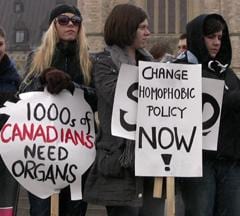Organ donations in Ontario have dropped sharply in the year since Health Canada imposed stricter rules on organ donations from gay men.
According to Gary Levy, the director of Canada’s largest organ transplant program at Toronto’s University Health Network, the number of deceased donors in the province dropped from 199 in 2007 to 175 in 2008. Levy says there are no definitive statistics on how much of the decline was linked to the new rules for gay men.
In December 2007, Health Canada quietly enacted rules that prevent any man who has had sex even once with another man in the past five years from donating organs. Health Canada already bans any man who has had sex with another man (MSM) even once since 1977 from donating blood.
Doctors are still able to use organs from gay men if they get the recipient’s consent and the doctor signs an “exceptional release” form.
Levy says the drop in donors has meant deaths in Ontario.
“Potentially you can get seven organs from each person,” he says. “At least 120, 130 or 150 people died who could have benefitted from organs.”
Levy says there are no statistics to show to what extent the rules on gay men contributed to the drop in donations, but that the system can’t afford to lose any potential donors.
“How much it hurt us we can’t tell at the moment,” he says, “but organ donation is a very precarious thing. When things like this happen, I don’t think it turned out to be a positive. It didn’t help us to work with the public.
“I worked tirelessly to get the federal government to understand that it was unnecessary and it did nothing for safety.”
Levy says the 199 donors in 2007 was a record year for organ donors in the province. In 2006 there were 162 donors in the province, but Levy says the drop is still disappointing.
“The 199 could be looked at as a blip,” he says. “It’s not that substantive but it certainly was moving in the right direction. It’s very disappointing because people died.”
Neither Health Canada nor Canadian Blood Services (CBS) — which took over the national administration of organ donations in April, as well as controlling blood donations — could provide national figures for 2008.
Levy says he will continue to sign exceptional releases for donations from gay men, as well for donations from other groups who have to undergo the process.
“Age is one factor,” he says. “Over the age of 55 is considered an exceptional release. If they were a drug addict, which is not the ownership of any element of society, that’s an exceptional release.
“I sign exceptional releases at least 60 or 70 times a year. There are at least 100 to 150 exceptional release forms signed in Ontario each year.”
Joshua Ferguson of the group Standing Against Queer Discrimination (SAQD) — which has been campaigning against the blood and organ donation policies — says those policies are unlikely to change any time soon. He says things are worse since CBS took over.
“The MSM policy is now being regulated by the same source that is unwilling to change an outdated, stagnant policy based on ideologically founded fears rather than current epidemiological evidence,” states Ferguson in an email.
Ferguson says he was recently asked to take part in a consultation with CBS. He says CBS appears to be ignoring medical and scientific research.
“The organ and blood donation policies are now imbricated in political and public relation reasons rather than ethical and epidemiological ones,” he states.
Ferguson says participants in the consultation told CBS that policies should focus on risk rather than sexual orientation.
“A general consensus from the meeting is that the MSM permanent deferrals need to focus on behavioural-based questions that would articulate the actual risky sexual behaviours that actually places someone at a higher risk, regardless of their sex and/or sexual orientation,” he writes.


 Why you can trust Xtra
Why you can trust Xtra


